Blog Ecobraz Eigre

The National Solid Waste Policy (PNRS) and electronic waste in Brazil
Introduction to the National Solid Waste Policy (PNRS)
The National Solid Waste Policy (PNRS), instituted by Law No. 12.305/2010, establishes guidelines for the integrated management and environmentally appropriate management of solid waste in Brazil. Its aim is to promote the reduction, reuse, recycling and proper final disposal of waste, including the growing challenge of e-waste.
Challenges of e-waste in Brazil
Electronic waste comprises discarded electrical and electronic equipment such as computers, cell phones, televisions and other devices. With the rapid technological evolution, the volume of electronic waste has increased significantly, generating environmental impacts and health risks due to the presence of heavy metals and toxic components.
PNRS guidelines for the management of electronic waste
The PNRS highlights the shared responsibility between manufacturers, importers, traders, consumers and public authorities for the proper management of electronic waste. This involves the implementation of reverse logistics systems, which facilitate the collection and correct disposal of these materials, promoting recycling and avoiding irregular disposal.
Reverse logistics and recycling as sustainable solutions
Reverse logistics is one of the pillars of the PNRS for the treatment of electronic waste. It allows products and their components to be returned to the production cycle, reducing the extraction of natural resources and minimizing environmental impact. Encouraging the recycling of materials such as glass, plastic and metals contained in electronic devices contributes to more sustainable development.
Importance of environmental awareness and education
In addition to regulation, the effectiveness of the PNRS depends on making the population aware of the dangers of improper disposal of electronic waste and the correct practices for its disposal. Educational campaigns and partnerships with environmental organizations help promote a culture of sustainability and responsible consumption.
Challenges and future prospects
Although the PNRS has brought important advances, Brazil still faces challenges in implementing the legislation, including the need for adequate infrastructure for the collection and recycling of e-waste, as well as increased investment in the sector. Technological innovation and social engagement are fundamental if the country is to make progress in the efficient and environmentally correct management of solid electronic waste.
Conclusion
The management of electronic waste in Brazil, guided by the National Solid Waste Policy, represents an essential step towards sustainable development. The effective application of legislation, combined with the active participation of society, can minimize environmental impacts and transform waste into resources, promoting a cleaner and healthier future.

Deixe um comentário
O seu endereço de e-mail não será publicado. Campos obrigatórios são marcados com *